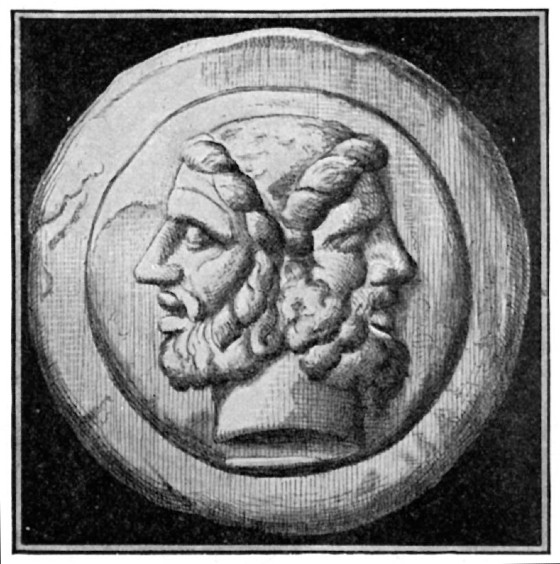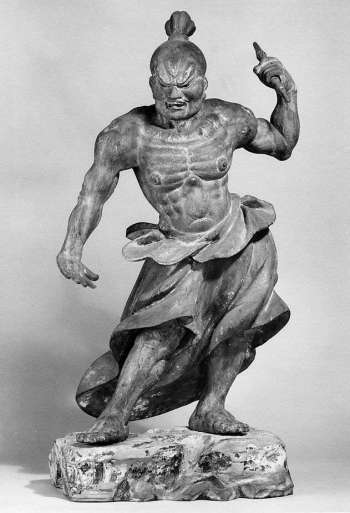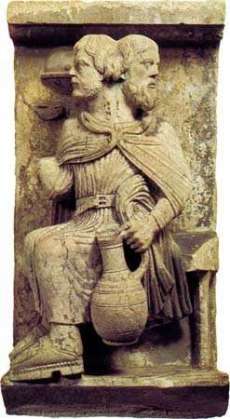
A Janus-faced coin. From blogspot.com
Economic theory inspired by the Buddha’s worldview and teachings differ from that of the market economy in many aspects. At the outset, the very definition of wealth is substantially different. Although the Buddha never denied that monetary affluence, such as money, gold, and silver is a kind of wealth, he considered this material notion of wealth unreliable. Instead, the Buddha (AN 7.6 and AN 7.7) taught that there are seven worthy kinds of wealth, namely: (1) faith; (2) virtuous behavior; (3) learning; (4) generosity; (5) wisdom; (6) moral shame; and (7) moral dread.
In view of his deeper insights into the true nature of material and moral wealth, the Buddha sees that monetary wealth could be as dangerous as a snake, whereas intangible moral qualities are real treasures. While material wealth can be taken away (by fire, water, kings, thieves, and displeasing heirs), and deepen our greed, hatred, and delusion, the seven kinds of moral wealth are truly worthy because they cannot be taken away and they lead to our true sustainable happiness. It is also for this reason the Buddha does not associate the suffering of poverty and indebtedness simply with the lack of money but with the lack of moral cultivation. We may be more familiar with poverty and indebtedness in monetary terms: being buried under a huge pile of debt, being unable to ever pull oneself out of a sinking hole of interest payments, being reprimanded, incriminated, and imprisoned by the authorities as a result of failing to repay debt. These are indeed suffering in the world. However, the Buddha reminds us that those being engulfed by debt are those who accumulate huge burden of bad kamma through misconduct in body, speech and mind:
. . . having no faith, no sense of moral shame, no moral dread, no energy, no wisdom in [cultivating] wholesome qualities, that a poor destitute, indigent person engages in misconduct by body, speech, and mind. (AN 6.45)
In the opposite case, the wise person who cultivates moral qualities and wisdom is free and happy in his present and future lives. The highest freedom from debt is sorrowless, dust-free, and secure:
With the destruction of the fetters of existence, for the stable one, rightly liberated, the knowledge occurs: “My liberation is unshakable.” This is the supreme knowledge; this is unsurpassed happiness. (AN 6.45)
Among the seven kinds of moral wealth, moral shame and moral dread have unique importance. The Buddha regards them as the underlying safeguards of morality. Moral shame (Pali: hiri) is an inner sense of shame; an internal reflection looking inside and feeling ashamed of moral wrongdoings out of a feeling of honor or self-respect. It pushes us to counteract our deep-rooted unwholesome mental states of greed, hatred, and ignorance. They are hindrances keeping us away from achieving sustainable happiness. Moral dread (Pali: ottappa) is, on the other hand, an external oriented fear of the blame and punishment, or the frightening results of wrongdoing through kamma. This fear of the moral consequences puts pressure on us to stay away from unwholesome thoughts and actions.
 Temple guardian from early 14th century Japan. From metmuseum.org
Temple guardian from early 14th century Japan. From metmuseum.orgAs Bhikkhu Bodhi (2010) explained, through these two internal and external dimensions of moral shame and moral dread, the cultivation of moral life is being safeguarded for each individual and in relation to others. It is thus a shield of morality for oneself and for society as a whole. The Buddha (Iti. 42) called them the two bright guardians of the world (Pali: sukka lokapala) because as long as these two guardians are not shaken, the moral standards of the world remain intact. When they are no longer valued and in force, the human world “falls into unabashed promiscuity and violence, becoming almost indistinguishable from the animal realm.”
Accordingly, these two guardians protect us from making poor choices leading to moral degradation, and motivate us toward making good choices leading to moral cultivation. This inward and individual examination contributes to the abandoning of hindrances and accumulation of factors leading to further awakening, ultimately supporting the cultivation of moral characters at the individual level. Given the strong interdependent nature of each individual to other living beings, society, and the environment, what is being achieved at the individual level in turn affects the rest of the world, accumulating moral capital in society as a whole.
Halkias (2013) argues that moral value at the individual level and society at large are intertwined. Actions and the state of mind of the individual can influence and contribute to that of society from the bottom up and, in turn, a leader should be a righteous one attending to the needs of society from the top down. When the two guardians of moral shame and moral dread triumph, individuals and society as a whole are protected from the three poisons (greed, hatred, and ignorance) originated from the thoughts and behaviors of individuals. If the two guardians are defeated, these poisons do not just affect individuals but contaminate institutions and society at large:
The role of the Buddhist community, then is to influence policy-making to ensure that it accords with the Dhamma, while an ideal ruler would be a righteous leader that works for the welfare and harmony of his subjects. (Halkias 2013)
 Janus personified. From britannica.com
Janus personified. From britannica.comTherefore, Halkias (2013) argues that social development and economic growth without the inner transformation of each individual and society will not lead to healthy and harmonious communities. From the Buddhist perspective, the aim of “effective social policies and laws is society’s inner transformation, the recognition that the Buddhist precepts . . .”
Bhikkhu Bodhi (2010) illustrates that these two guardians of moral shame and moral dread can be compared with the Roman god Janus, who guards the gate to the heavens. Janus has a double-faced head looking in opposite directions—one looking to the future and the other looking to the past. Janus is therefore depicted as the god of doors, beginnings and endings, and transitions (the month of January is named after him). Janus also represents the transition between the uncivilized and the civilized, the rural and the urban, and youth and adulthood.
Perhaps a modern analogy of moral shame and moral dread are the cameras on our mobile devices. One is a back-facing camera looking outward to the world, the other is the front-facing camera (the so-called “selfie” camera) looking inward. Both are arguably equally important for beautiful pictures. Similarly, we need to enhance our ability to look inward and outward, hence achieving a much-needed transformation at the individual level through moral cultivation to safeguard “personal decency,” ultimately bringing our moral character outward to preserve “the dignity of the human race.” (Bodhi 2010)
References
AN 6.45. 2012. "Debt." In The Numerical Discourses of the Buddha, translation of Aṅguttara Nikāya by Bhikkhu Bodhi, 914-917. Somerville: Wisdom Publications.
Bodhi, Bhikkhu (trans.). 2010. "The Guardians of the World”. Access to Insight (BCBS Edition). 5 June 2010. http://www.accesstoinsight.org/lib/authors/bodhi/bps-essay_23.html.
Bodhi, Bhikkhu (trans.). 2013. "Ugga Sutta: To Ugga" (AN 7.7). Access to Insight (BCBS Edition). 30 November 2013. http://www.accesstoinsight.org/tipitaka/an/an07/an07.007.than.html.
Halkias, Georgios T. 2013. "The Enlightened Sovereign; Buddhism and Kingship in India and Tibet." In A Companion to Buddhist Philosophy, edited by Steven M. Emmanuel, 491-511. Oxford: Wiley-Blackwell.
Thanissaro, Bhikkhu (trans. from Pali). 2013. "Itivuttaka: The Group of Twos" (Iti 42). Access to Insight (BCBS Edition). 30 November 2013. http://www.accesstoinsight.org/tipitaka/kn/iti/iti.2.028-049.than.html#iti-042
Thanissaro, Bhikkhu (trans. from Pali). 2013. "Dhana Sutta: Treasure" (AN 7.6). Access to Insight (BCBS Edition). 30 November 2013. http://www.accesstoinsight.org/tipitaka/an/an07/an07.006.than.html.
See more
Janus, Roman God (Encyclopedia Britannica)
Related features from Buddhistdoor Global
Buddhistdoor View: The Shadow Sides of Secular and Religious Ethics—A Case for Dialogue
Buddhist Economics with George Kinder: Creating a Mindful Golden Civilization
Buddhist Economics: The Beginnings of a Promising Approach
The Impossibility of Outsourcing Happiness
Happiness Before Profit: Bhutan Seeks to Redefine Business Using Buddhist Values
More from Mindful Capital By Ernest Chi-Hin Ng

















